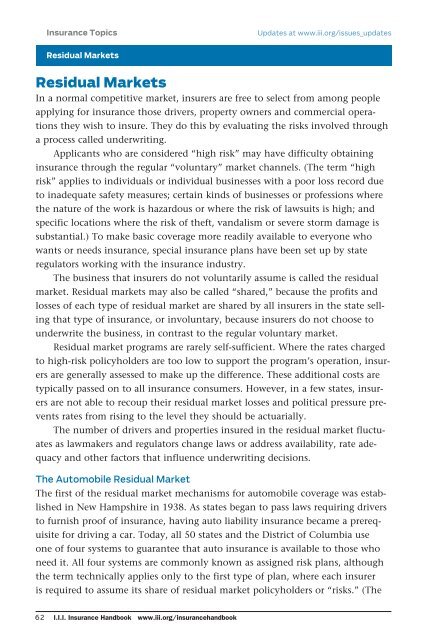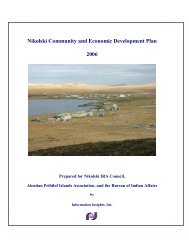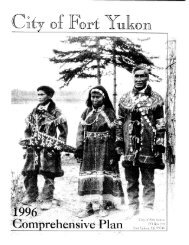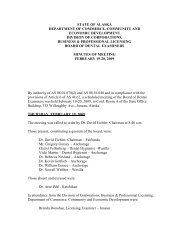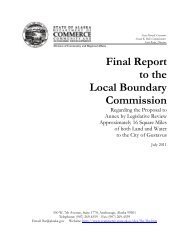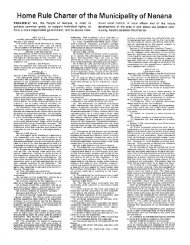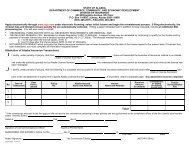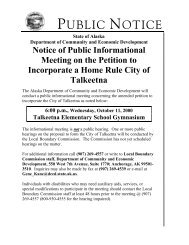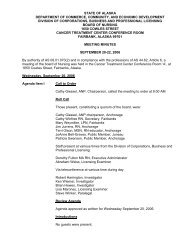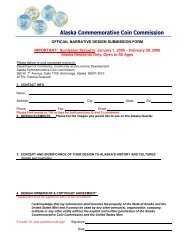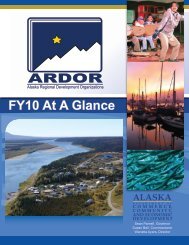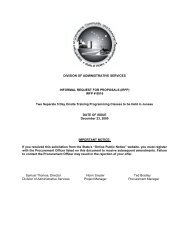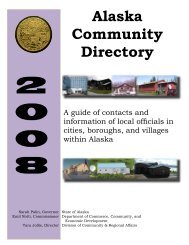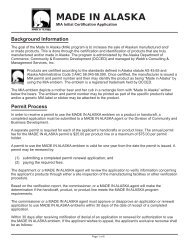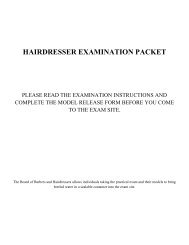Insurance Handbook - Alaska Department of Community and ...
Insurance Handbook - Alaska Department of Community and ...
Insurance Handbook - Alaska Department of Community and ...
Create successful ePaper yourself
Turn your PDF publications into a flip-book with our unique Google optimized e-Paper software.
<strong>Insurance</strong> Topics Updates at www.iii.org/issues_updates<br />
Residual Auto <strong>Insurance</strong> Markets<br />
Residual Markets<br />
In a normal competitive market, insurers are free to select from among people<br />
applying for insurance those drivers, property owners <strong>and</strong> commercial operations<br />
they wish to insure. They do this by evaluating the risks involved through<br />
a process called underwriting.<br />
Applicants who are considered “high risk” may have difficulty obtaining<br />
insurance through the regular “voluntary” market channels. (The term “high<br />
risk” applies to individuals or individual businesses with a poor loss record due<br />
to inadequate safety measures; certain kinds <strong>of</strong> businesses or pr<strong>of</strong>essions where<br />
the nature <strong>of</strong> the work is hazardous or where the risk <strong>of</strong> lawsuits is high; <strong>and</strong><br />
specific locations where the risk <strong>of</strong> theft, v<strong>and</strong>alism or severe storm damage is<br />
substantial.) To make basic coverage more readily available to everyone who<br />
wants or needs insurance, special insurance plans have been set up by state<br />
regulators working with the insurance industry.<br />
The business that insurers do not voluntarily assume is called the residual<br />
market. Residual markets may also be called “shared,” because the pr<strong>of</strong>its <strong>and</strong><br />
losses <strong>of</strong> each type <strong>of</strong> residual market are shared by all insurers in the state selling<br />
that type <strong>of</strong> insurance, or involuntary, because insurers do not choose to<br />
underwrite the business, in contrast to the regular voluntary market.<br />
Residual market programs are rarely self-sufficient. Where the rates charged<br />
to high-risk policyholders are too low to support the program’s operation, insurers<br />
are generally assessed to make up the difference. These additional costs are<br />
typically passed on to all insurance consumers. However, in a few states, insurers<br />
are not able to recoup their residual market losses <strong>and</strong> political pressure prevents<br />
rates from rising to the level they should be actuarially.<br />
The number <strong>of</strong> drivers <strong>and</strong> properties insured in the residual market fluctuates<br />
as lawmakers <strong>and</strong> regulators change laws or address availability, rate adequacy<br />
<strong>and</strong> other factors that influence underwriting decisions.<br />
The Automobile Residual Market<br />
The first <strong>of</strong> the residual market mechanisms for automobile coverage was established<br />
in New Hampshire in 1938. As states began to pass laws requiring drivers<br />
to furnish pro<strong>of</strong> <strong>of</strong> insurance, having auto liability insurance became a prerequisite<br />
for driving a car. Today, all 50 states <strong>and</strong> the District <strong>of</strong> Columbia use<br />
one <strong>of</strong> four systems to guarantee that auto insurance is available to those who<br />
need it. All four systems are commonly known as assigned risk plans, although<br />
the term technically applies only to the first type <strong>of</strong> plan, where each insurer<br />
is required to assume its share <strong>of</strong> residual market policyholders or “risks.” (The<br />
62 I.I.I. <strong>Insurance</strong> <strong>H<strong>and</strong>book</strong> www.iii.org/insuranceh<strong>and</strong>book


